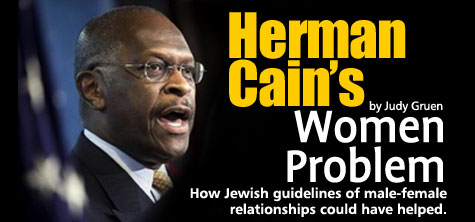 Vampire Weekend's Surprising Jewish Stories
Vampire Weekend's Surprising Jewish Stories


4 min read
How Jewish guidelines of male-female relationships could have helped.
Many years ago I worked for a company and had a boss who was different from any other executive I had known till that point in my professional life. My boss, Glenn, famously never went out to lunch with any single woman in the office. By "single" I don’t necessarily mean unmarried. He would only go out for lunch with a female if at least one other person – male or female – joined them. To Glenn, three wasn’t a crowd, it was an insurance policy.
He was also married and known to be a religious Christian, and no doubt his faith-based principles informed his policies about lunching with work associates. Way back then, I was still in the early stages of exploring what traditional Judaism had to say to me – a young woman who naturally wanted to be modern and progressive, as I defined it. I thought my boss was astonishingly old-fashioned, but I also secretly admired him for the care he took in safeguarding his marriage and his reputation.
Related Article: Shaking Hands with the Opposite Gender
I couldn’t help but think of Glenn this past week as presidential hopeful Herman Cain fights off accusations of sexual harassment by a growing number of women. Of course, it’s easy to accuse, and as of yet nothing seems clearly and irrefutably damning. Jewishly speaking, we are not allowed to believe allegations of wrongdoing without sufficient evidence. But the media blitz surrounding Cain has already done tremendous and possibly fatal damage to his campaign.
When I worked for Glenn, I was so new to Jewish teachings that I didn’t even realize that his scruples about socializing with women other than his wife closely followed Jewish guidelines. Judaism teaches that men and women who are not married to one another or not close relations (such as sister and brother), should never be in secluded contact with one another. And a married man or woman should also avoid socializing for its own sake with other women or men, even over lunch.
In Judaism, many of the laws that regulate our behavior are protective layers against our own weaknesses.
Of course, in today’s world the lines between work and socializing are increasingly blurred, which makes following these guiding principles much trickier. After all, certain things are expected in the professional world that can cross that safety line, and Jews who are trying to adhere to mitzvot have to make decisions every day that test how they will be perceived by colleagues, and perhaps their chances for professional advancement. For example, you want to avoid a gathering at a bar after work to celebrate the completion of a project, will you be seen as anti-social? And if you are seen as anti-social, might you be passed over for a promotion? These and other situations are ones that many Jews wrestle with regularly.
There’s a famous saying that "fences make good neighbors," and that aphorism is very apt here. In Judaism, many of the laws that regulate our behavior are protective layers against our own weaknesses. They are a tacit acknowledgment that even good men and women can find themselves in situations where they will be vulnerable to human weakness, or exploitative behavior by someone who might one day become either the accuser or the accused. In Jewish parlance, these measures are often known as "fences," and it’s easy to see why. If Herman Cain or any of the women who have accused him of inappropriate or exploitative behavior had stayed behind the “fence,” they might have remained friendly acquaintances instead of hostile adversaries.
Herman Cain is only the latest in an ongoing parade of influential or famous men to be accused of sexual impropriety, and others are sure to follow. And with an increasingly slippery definition of what constitutes “inappropriate” behavior, we can’t rely even on these “fences” to offer a fool-proof guarantee against allegations like this. For that, we’d need more of a Berlin Wall, which creates a different kind of repression.
Jewish laws guiding male-female relations may seem not only old-fashioned but overly restrictive, but the maelstrom engulfing Herman Cain is a good reminder that these laws are actually liberating for both men and women. When you keep this safety net around your relationships, you’d be hard-pressed to find yourself the object of unwanted advances. You’d also be a much harder target for allegations in the first place.
